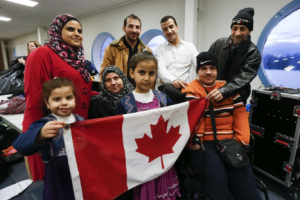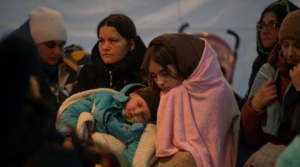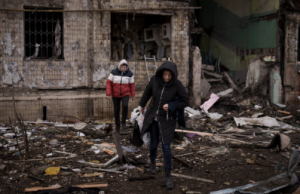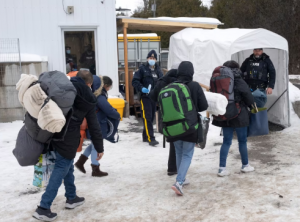
A Syrian refugee family at a welcoming dinner on Toronto’s waterfront. (photo by Bernard Weil/Toronto Star via Getty Images)
Kara Brulotte • Posted: 2-3-2023
Refugees, Syria, Ukraine, Justice
With Russia’s invasion of Ukraine, Ukrainian citizens are being forced to flee to various countries across the world and sending the global community into a familiar frenzy. Whenever a major war occurs anywhere in the world, refugees once again become a hot topic of debate. Through the generations, politicians have to decide what to do, and public opinion sways on whether their country should accept or deny asylum seekers. This time, most Canadians seem to be in support of Ukrainian refugees – as of July 2022, 64% of Canadians supported accepting more, according to an Ipsos poll. However, Canadians haven’t always been so open.
During the Syrian civil war, the attitude towards refugees was starkly more negative in Canada. The Trudeau government brought in a bit more than 44,000 Syrians as of 2020, about 0.2% percent of their population. The public reaction to this was extremely mixed, with only 47% of Canadians agreeing with the number of refugees, according to an Angus Reid Institute poll in early 2017. 41% believed Canada has already accepted too many and should immediately halt the entry of Syrians to the country. One month before this poll was conducted, former US president Donald Trump enacted his “Muslim ban”, banning immigrants and refugees from several Muslim majority countries, including Syria. In the Angus Reid Institute study, a quarter of Canadians believed that the Canadian government should have enacted a similar ban, a stance worlds away from the current acceptance of Ukrainian refugees.

Ukrainian refugees rest inside a tent in Medyka, Poland after fleeing the Russian invasion. (Visar Kryeziu/The Associated Press)
Since the Russia invasion, Canada has accepted more than 150,000 Ukrainians immigrants (this includes permanent Canadian residents), according to the Canadian government. It has also approved temporary residence visas for more than 550,000 Ukrainians, more than 1% of Ukraine’s total population, in only one year. This is more than twelve times the amount of Syrian refugees accepted into the country over five years, with far less pushback being experienced from the Canadian population. The divide is clear, especially now, with only 35% of Canadians being in support of accepting more Syrian refugees, despite the fact that the conflict is far from over.

Residents remove their belongings from a destroyed building in Kyiv after it was hit by artillery shelling. (Felipe Dana/AP Photo)
The reasons for this difference in perception are numerous and unclear. Ukraine is fresher in the minds of the global community. It’s being invaded by a foreign power, while Syria is involved in a civil war, even with the large amounts of foreign intervention. The situation in Syria is far more complicated, with multiple groups inside the country all vying for control. There is also the influence of Iran, the neighbouring Gulf States, and the United States, who all have their own agendas in the region. All in all, the blame is a lot more difficult to place. More simply, there are the divisions in language, religion, and most of all, race. But war, in both countries, has been devastating.
Racism and Islamophobia have been on the rise in the West since the beginning of the century. It has taken hold here in Canada, with bills outlawing public service workers from wearing religious symbols, which predominantly affects Muslims, as well as Hindus and Sikhs. Hate crimes against Arabs and West Asians have risen by 46% from 2019 to 2022, according to Stats Canada. Hate crimes against the Muslim population were up by 71% , according to the same study. It is clear in Canada’s reluctance to accept immigrants from Syria, with strong public pushback, while it welcomes Ukrainians with open arms.

A family of asylum seekers from Colombia is met by RCMP officers after crossing the border at Roxham Road into Canada on Feb. 9, at Champlain, New York. (Ryan Remiorz/The Canadian Press)
With a steady stream of refugees and immigrants coming from all corners of the world, the biases of Canadian citizens and the government must be closely examined. This can even be seen with the current situation at Roxham road, where thousands cross over from the United States every year. There is a wide push to close the road, with even Quebec Premier Francois Legault and Progressive Conservative Party leader Piere Polieve calling for the unofficial border crossing to be closed. It isn’t just Syrian asylum seekers being heavily regulated. Ukrainian citizens are in need of aid, and letting them into Canada is the right thing to do. However, this open door policy must be applied to all people equally. Refugees, from any country, are people that deserve Canada’s help. Once we begin to choose, it is the ones who need it most who are left behind.
